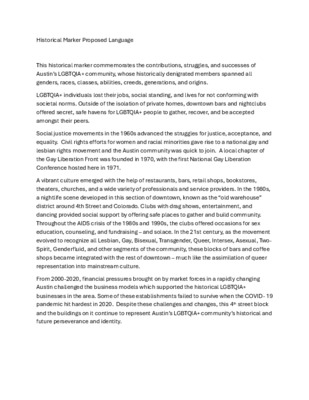Item 2: Proposed Language — original pdf
Backup

Historical Marker Proposed Language This historical marker commemorates the contributions, struggles, and successes of Austin’s LGBTQIA+ community, whose historically denigrated members spanned all genders, races, classes, abilities, creeds, generations, and origins. LGBTQIA+ individuals lost their jobs, social standing, and lives for not conforming with societal norms. Outside of the isolation of private homes, downtown bars and nightclubs offered secret, safe havens for LGBTQIA+ people to gather, recover, and be accepted amongst their peers. Social justice movements in the 1960s advanced the struggles for justice, acceptance, and equality. Civil rights efforts for women and racial minorities gave rise to a national gay and lesbian rights movement and the Austin community was quick to join. A local chapter of the Gay Liberation Front was founded in 1970, with the first National Gay Liberation Conference hosted here in 1971. A vibrant culture emerged with the help of restaurants, bars, retail shops, bookstores, theaters, churches, and a wide variety of professionals and service providers. In the 1980s, a nightlife scene developed in this section of downtown, known as the “old warehouse” district around 4th Street and Colorado. Clubs with drag shows, entertainment, and dancing provided social support by offering safe places to gather and build community. Throughout the AIDS crisis of the 1980s and 1990s, the clubs offered occasions for sex education, counseling, and fundraising – and solace. In the 21st century, as the movement evolved to recognize all Lesbian, Gay, Bisexual, Transgender, Queer, Intersex, Asexual, Two- Spirit, Genderfluid, and other segments of the community, these blocks of bars and coffee shops became integrated with the rest of downtown – much like the assimilation of queer representation into mainstream culture. From 2000-2020, financial pressures brought on by market forces in a rapidly changing Austin challenged the business models which supported the historical LGBTQIA+ businesses in the area. Some of these establishments failed to survive when the COVID- 19 pandemic hit hardest in 2020. Despite these challenges and changes, this 4th street block and the buildings on it continue to represent Austin’s LGBTQIA+ community’s historical and future perseverance and identity.